|
|
 |
|
 |
The Intergovernmental Panel on Climate Change (IPCC) was set up in 1988 to provide comprehensive assessments of the state of scientific, technical and socio-economic knowledge on climate change, its causes, potential impacts and response strategies.
Since its inception in 1988 the IPCC has prepared five multi-volume assessment reports, which can be accessed under Publications.
The IPCC and former US Vice-President Al Gore were awarded the Nobel Peace Prize in 2007 for their work on climate change.
Note: Some links take the reader to English-language documents/pages where translations are not available.
 |
 |
The Fifth Assessment Report (AR5) |
In 2014, the IPCC finalized the Fifth Assessment Report (AR5), which comprises three contributions on the physical science basis; impacts, adaptation and vulnerability;
and mitigation of climate change prepared by the IPCC's three Working Groups, plus a Synthesis Report.
The Working Group I contribution was accepted and approved in September 2013. The Working Groups II and III contributions were accepted and approved in March and April
2014 respectively, and the Synthesis Report was approved in November 2014.
Compared to previous reports, AR5 puts greater emphasis on assessing the socio-economic aspects of climate change and implications for sustainable development, regional
aspects, risk management and the framing of a response through both adaptation and mitigation.
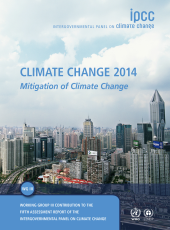 |
CLIMATE CHANGE 2014
Mitigation of Climate Change
Working Group III Contribution to the
Fifth Assessment Report of the IPCC
Summary for Policymakers
(available in English only, yet)
Technical Summary
(available in English only, yet)
Full Report
(available in English only) |
More information on the AR5 can be found in the AR5 English pagehere.
 |
 |
IPCC Special Reports |
Besides the Assessment Reports, the IPCC publishes Special Reports on specific topics such as aviation; regional impacts of climate change; technology transfer; emissions scenarios; land use; land use change and forestry; carbon dioxide capture and storage; and on the relationship between safeguarding the ozone layer and the global climate system. They can be accessed under Publications.
The latest of these Special Reports were released in 2011:
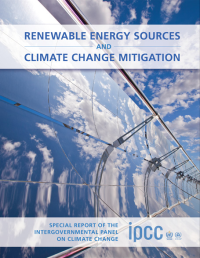
|
|
Special Report on Renewable Energy Sources and Climate Change Mitigation (SRREN)
SRREN was approved and accepted at the 11th Session of Working Group III that took place on 5-8 May 2011 in Abu Dhabi, United Arab Emirates.
Summary for Policymakers/Technical Summary
SRREN Website (English)
Videos (English/French)
|
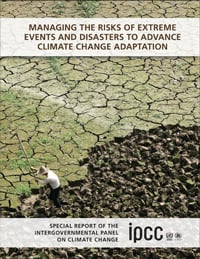
|
|
Special Report on Managing the Risks of Extreme Events and Disasters to Advance Climate Change Adaptation (SREX)
SREX was approved and accepted at the first Joint Session of IPCC Working Group I and II that met on 14-17 November 2011, in Kampala, Uganda
Summary for Policymakers
SREX Website (English)
Video (English)
|
 |
 |
Methodology Reports |
The IPCC also prepares methodologies and guidelines for national greenhouse gas inventories through the Task Force on National Greenhouse Gas Inventories (TFI). These help Parties to the UNFCCC and its Kyoto Protocol to draw up national inventories of greenhouse gas emissions by sources and removals by sinks. The last major publication was the 2006 IPCC Guidelines for National Greenhouse Gas Inventories.
The TFI has produced two sets of additional guidance that were adopted and accepted by the IPCC at its 37th Session held on 14-18 October 2013 in Batumi, Georgia:
 the 2013 Supplement to the 2006 IPCC Guidelines for National Greenhouse Gas Inventories: Wetlands, (in English) provides methodological guidance on lands with wet and drained soils, and constructed wetlands for wastewater treatment
the 2013 Supplement to the 2006 IPCC Guidelines for National Greenhouse Gas Inventories: Wetlands, (in English) provides methodological guidance on lands with wet and drained soils, and constructed wetlands for wastewater treatment
 the 2013 Revised Supplementary Methods and Good Practice Guidance Arising from the Kyoto Protocol, (in English) provides Parties to the UNFCCC who report under the Kyoto Protocol with the additional guidance they need for its second commitment period. the 2013 Revised Supplementary Methods and Good Practice Guidance Arising from the Kyoto Protocol, (in English) provides Parties to the UNFCCC who report under the Kyoto Protocol with the additional guidance they need for its second commitment period.
These supplementary guidelines were prepared at the invitation of the Subsidiary Body for Scientific and Technological Advice of the UNFCCC and Conference of the Parties Serving as the Meeting of the Parties to the Kyoto Protocol to the UNFCCC respectively.
For more information please see the TFI website (English).
 |
 |
The Task Group on Data and Scenario Support for Impact and Climate Analysis |
The Task Group on Data and Scenario Support for Impact and Climate Analysis (TGICA) facilitates the distribution and application of climate change related
data and scenarios. TGICA oversees a Data Distribution Centre (DDC) that provides data sets, scenarios of
climate change and other environmental and socio-economic conditions, and other materials (e.g. technical guidelines on the use of scenarios and fact sheets offering
clarifying explanations/concise guidance on topical issues).
For more information visit the TGICA page (English).
 |
 |
Other useful links in the English-language pages |
For information about the various meetings that the IPCC organizes and documentation from these meetings, please see Meeting Documentation page.
For the full IPCC calendar of meetings and other important dates, please see the IPCC Calendar.
For IPCC press releases and other communications and outreach materials please see News and Outreach.
For presentations and speeches provided at various IPCC outreach events around the world, please see Presentations
and Speeches.
For information on the IPCC Scholarship Programme, please see IPCC Scholarship Programme.
 |
 |
What is the IPCC? |
Note: Some links take the reader to English-language documents where translations are not available

The World Meteorological Organization
Headquarters in Geneva. IPCC Secretariat
is hosted by WMO
The Intergovernmental Panel on Climate Change (IPCC) is the leading international body for the
assessment of climate change. It was established by the United Nations Environment Programme (UNEP) and
the World Meteorological Organization (WMO) in 1988 to provide the world with a clear scientific view on the
current state of knowledge in climate change and its potential environmental and socio-economic impacts. In the same year, the UN
General Assembly endorsed the action by WMO and UNEP in jointly establishing the IPCC.
The IPCC is a scientific body. It reviews and assesses the most recent scientific, technical
and socio-economic literature produced worldwide relevant to the understanding of climate change. It does not
conduct any research nor does it monitor climate related data or parameters.
It is an intergovernmental body. It is open to all member countries of the United Nations and WMO. Currently 195 countries are members of the IPCC. The Panel meets at least once a year in plenary at the level of government representatives where the main decisions about the IPCC work programme are taken and Bureau Members, including the Chair, are elected. Governments participate also in the scoping of reports, nomination of authors, the review process and accept, adopt and approve reports at plenary sessions.
Because of its scientific and intergovernmental nature, the IPCC embodies a unique opportunity to provide rigorous and balanced scientific information to
decision-makers. By endorsing the IPCC reports, governments acknowledge the authority of their scientific content. The work of the organization is therefore policy-relevant and
yet policy-neutral, never policy-prescriptive.
 |
 |
How the IPCC works |
Thousands of scientists from all over
the world contribute to the work of the IPCC on a voluntary basis as authors, contributors and reviewers. None of them is paid by the IPCC.
The Panel takes major decisions at plenary sessions of government representatives. A central IPCC Secretariat supports the work of the IPCC.
The IPCC is currently organized in three Working Groups and a Task Force. The Working Groups and Task Force are assisted by technical support units (TSUs), which are hosted and financially supported by the government of the developed country Co-Chair of that Working Group/Task Force. A TSU has also been established to support work on the Synthesis Report.
Working Group I deals with the physical science basis of climate change,
Working Group II with climate change impacts, adaptation and vulnerability,
and Working Group III with mitigation of climate change. The Working Groups meet in plenary at the level of
government representatives. The main objective of the Task Force on National Greenhouse Gas Inventories is
to develop and refine a methodology for the calculation and reporting of national greenhouse gas emissions and removals.
Besides the Working Groups and Task Force, further task groups and steering groups may be established for a limited or longer duration to consider a specific topic
or question. One example is the Task Group on Data and Scenario Support for Impact and Climate Analysis (TGICA).
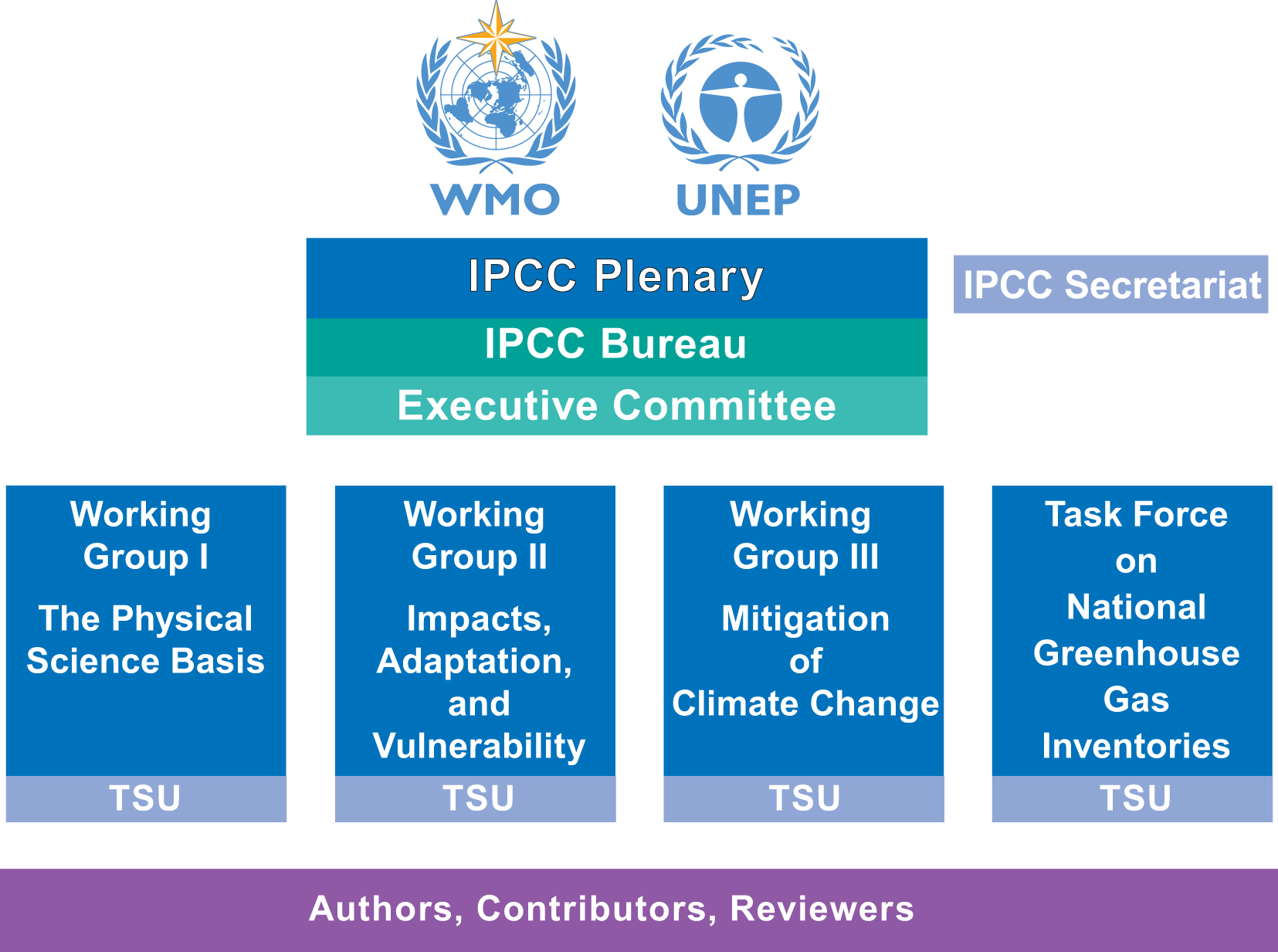 |
For more information on how the IPCC works visit the Structure pages (in English).
 |
 |
Factsheets |
What is the IPCC?
How does the IPCC select its authors?
What literature does the IPCC assess?
How does the IPCC review process work?
How does the IPCC approve reports?
How does the IPCC deal with alleged errors?
Timeline - highlights of IPCC history
The IPCC's work is guided by a set of principles and clear procedures for all the main activities of the organization. These processes and procedures are constantly
being reviewed and updated to ensure that they remain strong, transparent and reliable. For recent changes to IPCC procedures and related information see
Review of Processes and Procedures (English) which covers all the recent changes to IPCC
procedures approved by the Panel in the period 2010-2012.
|
The document "Principles Governing IPCC Work" lays
down the role of the IPCC, its organization, participation in it and its key procedures, and establishes comprehensiveness, objectivity, openness and transparency
as guiding principles of IPCC Work.
The following Appendices to the "Principles Governing IPCC Work" provide detailed rules and procedures:
Appendix A
is about the "Procedures for the preparation, review, acceptance, adoption,
approval and publication of IPCC Reports".
Including: Annex 1 - Tasks and Responsibilities for Lead Authors, Coordinating Lead Authors, Contributing Authors, Expert Reviewers and
Review Editors of IPCC Reports and Government Focal Points; Annex 2 - Procedure on the Use of Literature in IPCC reports; and Annex 3 - "IPCC Protocol for Addressing Possible Errors in IPCC Assessment Reports, Synthesis Reports,
Special Reports and Methodology Report"
Appendix B
covers "Financial Procedures for the Intergovernmental Panel on Climate Change"
(explanatory notes to the Financial Procedures for the IPCC) (Available in English only)
Appendix C
contains the "Rules of Procedures for the Election of the IPCC
Bureau and any Task Force Bureau".
|
In order to set priorities and guide decisions on whether to prepare Special Reports, Methodology Reports and Technical Papers, the IPCC has adopted
the "Decision Framework and Criteria for Special Reports, Methodology
Reports and Technical Papers". The IPCC also has a "Conflict of Interest Policy" and
an "IPCC Policy and Process for admitting Observer Organizations".
Assessment Reports
These are published materials comprising the full scientific and technical assessment of climate change, generally in three volumes, one for each of the Working Groups of the IPCC, plus a Synthesis Report. Each of the Working Group volumes is composed of individual chapters, an optional Technical Summary and a Summary for Policymakers. The Synthesis Report synthesizes and integrates materials contained within the Assessment Reports and Special Reports. It is written in a non-technical style suitable for policymakers and addresses a broad range of policy-relevant but policy-neutral questions. It is composed of a longer report and a Summary for Policymakers.
 |
 |
IPCC Fifth Assessment Report: Climate Change (AR5) |
Full report available in English only
 |
 |
IPCC Fourth Assessment Report: Climate Change (AR4) |
Full report available in English only
IPCC statement on the melting of Himalayan
glaciers - 20 January 2010 (PDF)

|
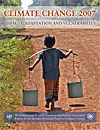
|
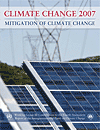
|
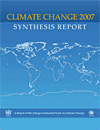
|
Working Group I Report
"The Physical Science Basis"
CLICK HERE
|
Working Group II Report
"Impacts, Adaptation and Vulnerability"
CLICK HERE
|
Working Group III Report
"Mitigation of Climate Change"
CLICK HERE
|
The AR4 Synthesis Report
CLICK HERE
|
 |
 |
IPCC Third Assessment Report: Climate Change 2001 (TAR) |
Full report available in English only
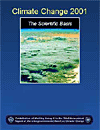 |
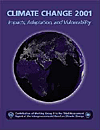 |
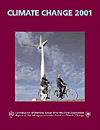 |
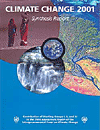 |
Working Group I:
The Scientific Basis |
Working Group II:
Impacts, Adaptation and Vulnerability
|
Working Group III:
Mitigation
|
Synthesis Report
|
 |
 |
IPCC Second Assessment Report: Climate Change 1995 (SAR) |
Digitized by the Digitization and Microform Unit, UNOG Library, 2010
Full report available in English only

|
 |
1992 Supplementary Reports |
Digitized by the Digitization and Microform Unit, UNOG Library, 2010
Full report available in English only

|

|

|
|
The Supplementary Report to The IPCC Scientific Assessment
CLICK HERE
|
The Supplementary Report to The IPCC Impacts Assessment
CLICK HERE
|
The IPCC 1990 and
1992 Assessments
CLICK HERE
|
|
 |
 |
IPCC First Assessment Report 1990 (FAR) |
Digitized by the Digitization and Microform Unit, UNOG Library, 2010
IPCC Special Reports
Special Reports are an assessment of a specific issue and generally follow the same structure as a volume of an Assessment Report. They are subject to the same writing, review and approval process as Assessment Reports.
.
 |
 |
Managing the Risks of Extreme Events and Disasters to Advance Climate Change Adaptation (SREX) |

|
|
IPCC, 2012 - Field, C.B., V. Barros, T.F. Stocker, D. Qin, D.J. Dokken, K.L. Ebi, M.D. Mastrandrea, K.J. Mach,
G.-K. Plattner, S.K. Allen, M. Tignor, and P.M. Midgley (Eds.)
Summary for Policymakers
IPCC, Geneva, Switzerland.
Available from the IPCC Secretariat
Full report in English (44 MB)
|
 |
 |
Renewable Energy Sources and Climate Change Mitigation (SRREN) |

|
|
IPCC, 2011 - Ottmar Edenhofer, Ramón Pichs-Madruga, Youba Sokona, Kristin Seyboth, Patrick Matschoss, Susanne Kadner, Timm Zwickel, Patrick Eickemeier,
Gerrit Hansen, Steffen Schloemer, Christoph von Stechow (Eds.)
Summary for Policymakers/Technical Summary
IPCC, Geneva, Switzerland.
Available from the IPCC Secretariat
Errata to SPM/TS (English printed version)
Note: The first print run of English version of the SPM and TS contained some editorial errors which were corrected and are reflected in the full published and electronic version of the Report as well as in subsequent print runs of the SPM and TS
Full report in English |
 |
 |
Carbon Dioxide Capture and Storage |
 |
 |
Safeguarding the Ozone Layer and the Global Climate System: Issues Related to Hydrofluorocarbons and Perfluorocarbons |
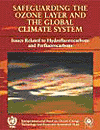 |
|
IPCC/TEAP, 2005 - Bert Metz, Lambert Kuijpers, Susan Solomon, Stephen O. Andersen, Ogunlade Davidson, José Pons, David de Jager, Tahl Kestin, Martin Manning, and Leo Meyer (Eds)
Summary for Policymakers and
Technical Summary
IPCC, Geneva, Switzerland.
Available from the IPCC Secretariat
Full Report (English only) -
 Table of Contents -
Table of Contents -
 Graphics
Graphics
Also available on CD-ROM.
|
 |
 |
Methodological and Technological Issues in Technology Transfer |
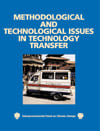 |
|
IPCC, 2000 - Bert Metz, Ogunlade Davidson, Jan-Willem Martens, Sascha Van Rooijen and Laura Van Wie Mcgrory (Eds.)
Summary for Policymakers
IPCC, Geneva, Switzerland.
Available from the IPCC Secretariat
 Full Report
HTML (English only) Full Report
HTML (English only)
|
 |
 |
Emissions Scenarios |
 |
 |
Land Use, Land-Use Change, and Forestry |
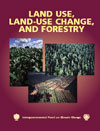 |
|
IPCC, 2000 - Robert T. Watson, Ian R. Noble, Bert Bolin, N. H. Ravindranath, David J. Verardo and David J. Dokken (Eds.)
Summary for Policymakers
IPCC, Geneva, Switzerland.
Available from the IPCC Secretariat
 Full Report
HTML (English only) Full Report
HTML (English only)
|
 |
 |
Aviation and the Global Atmosphere |
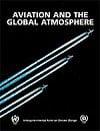 |
|
IPCC, 1999 - J.E. Penner, D.H. Lister, D.J .Griggs, D.J .Dokken, M. McFarland (Eds.)
Prepared in collaboration with the Scientific Assessment Panel to the Montreal Protocol on Substances that Deplete the Ozone Layer
Summary for Policymakers
IPCC, Geneva, Switzerland.
Available from the IPCC Secretariat
 Full Report
HTML (English only) Full Report
HTML (English only)
|
 |
 |
The Regional Impacts of Climate Change: An Assessment of Vulnerability |
 |
 |
Climate Change 1994: Radiative Forcing of Climate Change and An Evaluation of the IPCC IS92
Emission Scenarios |
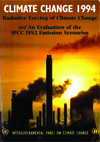 |
|
IPCC, 1994 - J.T. Houghton, L.G. Meira Filho, J. Bruce, Hoesung Lee, B.A. Callander, E. Haites, N. Harris and
K. Maskell (Eds.)
Cambridge University Press, UK. pp 339
Available from Cambridge University Press, The Edinburgh Building Shaftesbury Road, Cambridge CB2 2RU ENGLAND
Full Report in English
Digitized by the Digitization and Microform Unit, UNOG Library, 2010
|
 |
 |
IPCC Technical Guidelines for Assessing Climate Change Impacts and Adaptations |
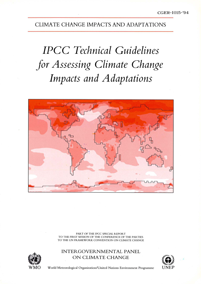 |
|
IPCC, 1994 - T.R.Carter, M.L.Parry, H.Harasawa, S.Nishioka
Department of Geography, University College London, UK and the Center for Global Environmental Research, National Institute for Environmental Studies, Japan. pp 59
Note: This publication is part of Climate Change 1994: Radiative Forcing of Climate Change and An Evaluation of the IPCC IS92 Emission Scenarios
OUT OF PRINT
Download pdf (English only)
|
Methodology Reports
These are published materials, which provide practical guidelines for the preparation of greenhouse gas inventories. They are intended to meet the inventory reporting requirements of Parties to the UNFCCC. They are supplemented by inventory software. They are subject to the same writing and review process as Assessment Reports. The Overview Chapters of Methodology Reports are adopted section by section by the Panel, while the report is accepted by the Panel.
 |
 |
2013 Supplement to the 2006 IPCC Guidelines for National Greenhouse Gas Inventories: Wetlands |
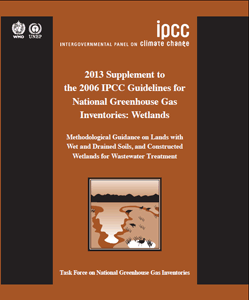 |
|
2014 – Hiraishi, T., Krug, T., Tanabe, K., Srivastava, N., Baasansuren, J., Fukuda, M. and Troxler, T.G. (eds). Published: IPCC, Switzerland
2013 Supplement to the 2006 IPCC Guidelines for National Greenhouse Gas Inventories: Wetlands
Available from TFI
For a CD-ROM or printed version, please contact the Technical Support Unit of the IPCC TFI at: nggip-tsu@iges.or.jp
 Read it on the TFI English website
Read it on the TFI English website
|
 |
 |
2013 Revised Supplementary Methods and Good Practice Guidance Arising from the Kyoto Protocol |
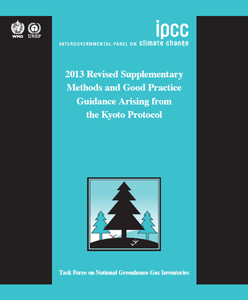 |
|
2014 – Hiraishi, T., Krug, T., Tanabe, K., Srivastava, N., Baasansuren, J., Fukuda, M. and Troxler, T.G. (eds). Published: IPCC, Switzerland
2013 Revised Supplementary Methods and Good Practice Guidance Arising from the Kyoto Protocol
Available from TFI
For a CD-ROM or printed version, please contact the Technical Support Unit of the IPCC TFI at: nggip-tsu@iges.or.jp
 Read it on the TFI English website
Read it on the TFI English website
|
 |
 |
IPCC Inventories software |
2012 - For Microsoft Windows.
Available for download or on CD ROM.
 |
 |
2006 IPCC Guidelines for National Greenhouse Gas Inventories |
 |
 |
Good Practice Guidance for Land Use, Land-Use Change and Forestry |
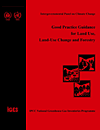 |
|
2003 - Edited by Jim Penman, Michael Gytarsky, Taka Hiraishi, Thelma Krug, Dina Kruger, Riitta Pipatti, Leandro Buendia, Kyoko Miwa, Todd Ngara, Kiyoto Tanabe
and Fabian Wagner
Good Practice Guidance for Land Use, Land-Use Change and Forestry
Available from TFI
Also available on CD ROM
 Read it on the TFI English website
Read it on the TFI English website
|
 |
 |
Definitions and Methodological Options to Inventory Emissions from Direct Human-induced Degradation of Forests and Devegatation of Other Vegetation Types |
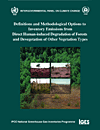 |
|
2003 - Edited by Jim Penman, Michael Gytarsky, Taka Hiraishi, Thelma Krug, Dina Kruger, Riitta Pipatti, Leandro Buendia, Kyoko Miwa, Todd Ngara,
Kiyoto Tanabe and Fabian Wagner
Definitions and Methodological Options to Inventory Emissions from Direct Human-induced Degradation of Forests and Devegatation of Other Vegetation Types
Available from TFI
 Read it on the TFI English website
Read it on the TFI English website
|
 |
 |
Good Practice Guidance and Uncertainty Management in National Greenhouse Gas Inventories |
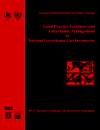 |
|
2000 - J. Penman, D. Kruger, .I Galbally, .T Hiraishi, B. Nyenzi, S. Emmanul, L. Buendia, R. Hoppaus, T. Martinsen, J. Meijer, K. Miwa and K. Tanabe (Eds.)
IPCC National Greenhouse Gas Inventories Programme
Good Practice Guidance and Uncertainty Management in National Greenhouse Gas Inventories
Available from TFI
Also available on CD ROM
 Read it on the TFI English website
Read it on the TFI English website
|
 |
 |
IPCC Greenhouse Gas Inventory Software for the Workbooks |
Available in English only
1997 - Microsoft Excel 5.0c or later version is necessary.
Also available on CD ROM
 |
 |
Revised 1996 IPCC Guidelines for National Greenhouse Gas Inventories |
1996 - JT Houghton, LG Meira Filho, B Lim, K Treanton, I Mamaty, Y Bonduki, DJ Griggs and BA Callender (Eds.)
Download from web site of TFI (English)
OUT OF PRINT / Available on CD-ROM
Greenhouse Gas Inventory Reporting Instructions. Volume 1
Greenhouse Gas Inventory Workbook. Volume 2
Greenhouse Gas Inventory Reference Manual. Volume 3
Technical Papers
Technical Papers are prepared on topics for which an objective international scientific/technical perspective is essential. They are based on material already in the IPCC Assessment Reports and Special Reports and are not accepted, approved or adopted by Working Groups or the Panel. They are finalized in consultation with the Bureau, which functions as an editorial board.
 |
 |
Climate Change and Water |
 |
 |
Climate Change and Biodiversity |
 |
 |
Implications of Proposed CO2 Emissions Limitations |
 |
 |
Stabilization of Atmospheric Greenhouse Gases: Physical, Biological and Socio-economic Implications |
 |
 |
An Introduction to Simple Climate Models used in the IPCC Second Assessment Report |
 |
 |
Technologies, Policies and Measures for Mitigating Climate Change |
Glossary
Glossary of Terms used the IPCC Fifth Assessment Report
Working Group I | Working Group II | Working Group III | Synthesis Report
Glossary of Terms used in the Special Report on Renewable Energy Sources and Climate Change Mitigation (SRREN)
Glossary of Terms used in the IPCC Fourth Assessment Report
Working Group I | Working Group II | Working Group III | Synthesis Report
Glossary of Terms used in the IPCC Third Assessment Report
Climate Change : a glossary by the Intergovernmental Panel on Climate Change (1995)
|
|